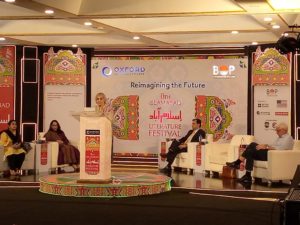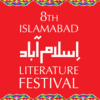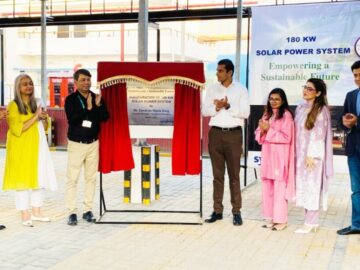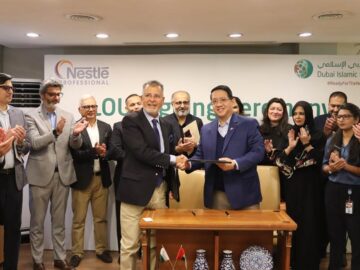
The third and final day of the 8th Islamabad Literature Festival (ILF) which is being held virtually and organized by Oxford University Press (OUP) was once again a day full of stimulating discourses, debates and book launches. Due to the Covid-19 pandemic, the ILF has continued as a virtual event with some face to face sessions and attended by select audience observing full COVID SOPs. The virtual edition of the 8th ILF was supported by many sponsors with Bank of Punjab as the lead sponsor of the event.
The day started with a session on Cartooning: No Laughing Matter. The famed cartoonists Nigar Nazar, creator of ‘Gogi’ and Shaukat Mahmood, creator of ‘Maxim’ with Ricardo Martinez Ortega and Mahnaz Yazdani sharing that creating wit and humour in pictures is indeed no laughing matter. The panel of speakers in Yaad e Raftagan had Fateh Muhammad Malik, Asghar Nadeem Syed, Najeeba Arif, Harris Khalique and Hameed Shahid and moderator Humaira Ishfaq pay a tribute to those who had passed on while leaving behind a rich legacy of their literary works for future generations.
The morning session also saw Kishwar Naheed, the matriarch of resistance writing, in conversation with Mujahid Barelvi, for the launch of her book, Buri Aurat ki Doosri Katha [The Bad Woman’s Second Story]—a sequel to her autobiography, Buri Aurat Ki Katha [The Bad Woman’s Story]. Kishwar Naheed remains one of Pakistan’s most prolific Urdu poets and newspaper columnists.
There were two more book launches. In Dying to Serve: Militarism, Affect and the Politics of sacrifice in the Pakistan Army, the author, Maria Rashid in conversation with Nida Kirmani spoke about how the book portrays the morale and commitment in Pakistan’s military culture in a compassionate way. The autobiography of Bacha Khan: My life and struggle is a lucid and historic English translation from the original Pukhto had a panel that included the translator, Imtiaz Ahmed Sahibzada with Rafiullah Kakar, Xenia Rasul Khan and was moderated by Fasi Zaka.
Changing landscapes: climate conversation in literature and society had an expert panel ofAhmad Rafay Alam, Elizabeth-Jane Burnett and Bilal Zahoor and moderator Zaighum Abbas discuss the awareness about human activities which have been the main driver of climate change.
The afternoon session Hairat ka Bagh saw author Hameed Shahid discuss his new work, a collection of short stories and a novel, imbued with the mysteries and wonders of life. Moderator Fasi Zakaengaged with the author, Omar Mukhtar Khan in Once upon a time in Murree which captures the writer’s nostalgic love for magical hill station. A special ILF panel with Vaqar Ahmed, Ashfaq Yousuf Tola, Aliya Hashmi Khan and moderated by Rashid Masood Alam discuss the impact of offshore tax havens in the session: Panama, Pandora and Pakistan, a hot current issue.
The session on: Digital Education: A new Normal started with an introduction by Fathima Dada, MD, Education Division, OUP UK in which she talked about a new global report published by OUP UK, the world’s largest university press, exploring the digital divide in education, following the shift to digital learning during the COVID-19 pandemic. This was followed by a panel discussion between Tallah Munir Khan, Nusrat Baquee, Sarah Farooq moderated by Daniel Atif further highlighting the trends shaping the digital learning landscape globally with a focus on Pakistan.
Book launch: Womansplaining: Navigating Activism, Politics and Modernity in Pakistan edited by Sherry Rehman sheds a light on the potential of Pakistani women, their innovative thought and commitment to activism. Book launch: Marginalization, Contestation, and Change in South Asian Cities edited by Nida Kirmani had Rohit Negi and Kabeer Dawani and Nida Kirmani discuss the struggles over space, resources, identities, and meaning taking place within South Asian cities.
The late afternoon sessions included Pakistan: Current challenges and Priorities with Maleeha Lodhi and Owen Bennett-Jones in conversation with Arifa Noor on current challenges confronting Pakistan.The powerful session on: We the people: What the Constitution says? where the distinguished panelists, Wasim Sajjad, Raza Rabbani and Ahmer Bilal Soofi moderated by Mujahid Barelvi aimed to dispel fallacies and lay forth the facts of the 1973 Constitution. Web Series: Future of Digital Entertainment in which leading arts and entertainment personalities, Beo Zafar, Mehreen Jabbar and Sania Saeed with moderator, Khalid Anam discussed the scope and scriptwriting for web series in the Digital Age.
Day 3 ended with the closing keynote speeches by Francis Pritchett, Najiba Arif and Owen Bennett Jones.
Alia Zafar , Group Head, People and Organizational Excellence, The Bank of Punjab congratulated Oxford University Press Pakistan on organizing a wonderful event and reiterated The Bank of Punjab’s commitment to support literature festivals being organized by Oxford University Press.
MD Oxford University Press Pakistan, Arshad Saeed Hussain thanked all the sponsors, especially Bank of Punjab and said, “The deliberations of the last three days have examined and analyzed the most consequential, the most important, issues of our time – whether geopolitical, economic, environmental, or educational – and helped each of us to develop an opinion towards them. And that is not all that this 8th ILF was about. It was about the Creative Spirit and directions and developments in fiction, drama, media, and the world of ideas…and it was about the enjoyment of poetry in Urdu, and in English. On Social Media, we were able to reach 671K (671,103) people through our posts, stories, videos and were able to engage a number of 40K (40,000) people On Twitter, our Tweets were able to receive 137.5K (137,500) impressions and our hashtag #IsbLF2021 and #IslamabadLiteratureFestival were trending yesterday on top 3 position amidst T20 World Cup Powerful Hashtags.Since Friday evening, our live sessions had 60K (60,000) views and it’s still growing. I would also like to add share one more achievement with you that since the creation of OUP YouTube Channel in January 2019, the channel has recieved 1,349,260 (1.3M) views so far. Thank you for all your tremendous response and support! Lastly, I am sure each of you will have your own particular list of moments that you will carry away from ILF 2021. For each of us will have found his or her knowledge added to, or viewpoint altered, in some way or the other. As I said at the inauguration, this Festival is about the need to understand that the future will be quite different to the past. And we will require all our imagination and all our creativity for Reimagining the Future”.
The 8th ILF was declared closed by Iftikhar Arif.










